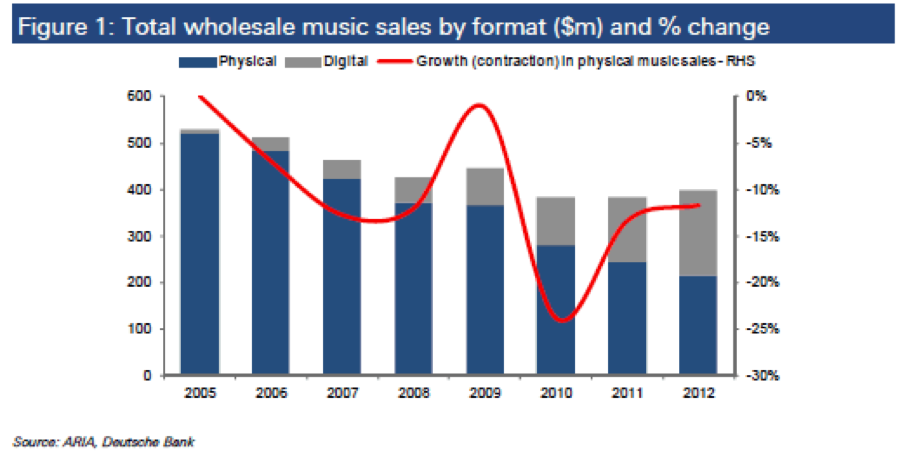
Online Retailing
As people conduct more and more of their lives online and the world progressively moves towards being “all digital,” the retail industry is undergoing a significant change.
Consumers are increasingly looking for low prices for top quality goods, and online retailers–able to save on the costs of expensive prime rental locations and sales staff–are meeting this demand.
The growing digitalization of media such as music, books and films plays into this need, and together, these factors are helping to redefine the retail landscape.
In 2012, the overall music market in Australia grew by 4 per cent at wholesale level. Over the same period, digital music sales increased by 31 per cent. Sales of physical music fell by 12 per cent*, a figure that is consistent with its average annual decline of 13 per cent over the past five years.
Based on this trend, the market share of physical music, which was nearly 100 per cent in 2005, will drop to well under 50 per cent in 2013.
The digitalization of music is just one aspect of the changing retail industry in Australia. Consumers seeking lower prices, wider choices and the convenience of shopping from any location are feeding a growing online presence of a diverse range of retailers.
A PwC and Frost & Sullivan report that summarizes the state of the retail industry in Australia can be found here.
Some of its main findings include:
• Online shopping in Australia accounts for 6.3% of total retail sales of $254 billion, of which approximately 45 per cent are made on offshore websites ($7 billion)
• The online retail category is expected to grow by 14 per cent per annum in the 2013-2016 period
• Retail categories that are predicted to display the strongest growth over the next five years include clothing, footwear, jewellery and fashion
• Lower prices are the key driver for shopping online
It will be interesting to see which brick and mortar retailers adapt successfully to these online challenges. To hear Roger Montgomery’s views on the retail industry in Australia, and how traditional vendors might respond, click here.
*Source: Australian Record Industry Association (ARIA)

Yes, agreed with your post Roger, there is definitely a need for retailers to embrace this structural change of consumers’ purchasing behaviour and mobile usage.
Gone are the days where people were going to a physical store to pay full price for a bunch of CDs with a dozen tracks when you only wanted one or a couple of tracks. Just have to see what happened to HMV in the UK.
Personally , I just can’t see any reason to continue selling goods that are digital by nature in a physical store. That just does not make sense to me.
Especially, with the NBN coming, there will be no need to go to your blockbuster store or go to your local oovie machine for “big” digital goods. Just buy a one-off movie from your smart-TV or mobile device directly online with Quickflix as you would with music on iTunes.
Actually, thinking about it, this is not valid just for digital goods, but also for goods that exist in a digital format, e.g. books. From a financial perspective, it becomes increasingly difficult to justify buying a physical book online, paying and waiting for delivery or driving and buying an expensive book locally, when you can buy a digital book instantly for a few bucks on the Internet. And with the explosion of mobile device and tablets, why wouldn’t you?
But that does not mean that it is all bad news. The physical sales of music have been continuously declining; but the growing digitalization has actually saved a declining music industry which was crippled with piracy (remember napster and kazaa?)
The cost of buying a song has decreased but the volume of music being sold has dramatically increased with a digital world accessed by billions of devices. And online music streaming services are taking this to the next level. Just check this great podcast/videocast from Standford’s Entrepreneurial Thought Leaders Series with Daniel Ek, founder of digital music service, Spotify: http://ecorner.stanford.edu/authorMaterialInfo.html?mid=2964
Basically instead of getting an average of $13 a year from music per consumer (as would any physical retailer selling music), a service such as Spotify gets a recurring $100 per consumer. Now that’s not bad!
As you said: “It will be interesting to see which brick and mortar retailers adapt successfully to these online challenges”. Well, the two below are definitely trying:
JB Hi-Fi is offering an online music streaming service called JB Hi-Fi Now: http://www.cnet.com.au/australian-music-streaming-services-compared-339331668.htm
US Barnes & Nobles came up with its own e-reader, the Nook http://www.barnesandnoble.com/u/nook/379003208/
Time will tell if these offerings from retailers going digital will work but it is definitely refreshing to see them trying.
Would I buy a fridge or washing machine on line? Too right I would . The most important consideration is the volume and does it fit in the hole left by the dead one. Brand and price suggests quality and with some well laid out detailed and interactive www sites the rest should pose no mystery. I walked around for five minutes one day with my check book hanging from my shirt pocket looking at a limited selection of washing machines in one of Mr.Harvey`s stores. At 190cm and 105kg I somehow made my way unnoticed out through half a dozen staff busy chatting to each other or ducking away. Buisness lives or dies by integrity and service. The Good guys got the dough that day and Bing the next time.Why? Why not. Perhaps with legislation could retailers press suppliers into exclusive line marketing.Exclusive lines of mass produced imported goods. Kind of sounds exotic doesnt it.After all we do live on an island.